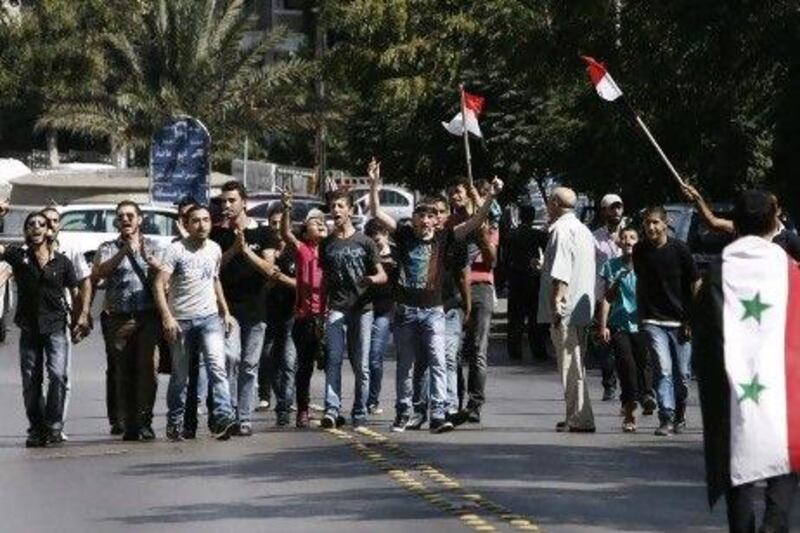DAMASCUS // A controversial film mocking Islam may have provoked angry demonstrations across the Muslim world, but in Syria, a country slipping ever deeper into a complex and bloody conflict, it seems to have barely raised a murmur.
"The subject hasn't come up," said a Sunni resident of the embattled southern Damascus suburbs, whose family has recently fled from the notoriously dangerous district of Qaboun, in the east of the city.
"Everyone is too busy trying to survive to worry about a stupid film they've not even seen. You hear those shells exploding? They're what we think about," he said.
For the Syrian president, Bashar Al Assad, the provocative and amateurish film, produced in the US by an Egyptian-American Christian and aired in part on YouTube, has come as a gift.
Independent analysts and academics said Damascus was keen to exploit the anger over the film, and redirect outrage away from it and back on to Washington.
The death of J Christopher Stevens, the US ambassador to Libya, in an attack that coincided with protests over the film, as well as assaults on other embassies in the region, has underscored lingering western fears about Arab uprisings against long-established autocrats.
"Assad has always said to the West, you may not like us but we're better than the extremist Muslims who'll take over if we fall," said a Syrian political analyst, who spoke on condition of anonymity.
"The film and, more importantly, the violent response to it from some Muslims has reminded the Americans of that and might give them second thoughts about trying to topple Assad."
There was a small, brief demonstration held outside the empty US Embassy building in Damascus on Monday - US diplomats were pulled out in February in protest against the use of violence by Syrian authorities.
On Tuesday the Syrian government issued a statement saying the film was part of a US and Israeli plot "targeting the Arab nation". It has long insisted the uprising against Mr Al Assad was part of that same conspiracy.
"The protest at the US Embassy was organised by the security services. It was not a popular outburst of anger and no one here takes it seriously," said the analyst.
As the Syrian uprising has turned from peaceful protests into an armed struggle, Islamist militants, including groups linked to Al Qaeda, have emerged. Although they only constitute a small minority of those involved in the war, their growing presence has added to alarm about what a post-Assad Syria might look like.
"If anything, the film and the riots it caused have helped Assad in two ways: it will warn the West not to get more involved in trying to topple him, and it will remind the Muslims fighting him, and asking for international help, that America is not their friend," said another Syrian political commentator, also on condition of anonymity.
An anti-regime activist from Deir Ezzor, the heartland of Syria's Sunni Arab tribes, said the film had been noticed by residents, despite the fact that a full-scale armed insurrection was under way.
"People are upset about it, it's just not their priority at the moment. But do not think it has been ignored," the activist said. He described a situation of ultra-conservative Islamic ideals growing in strength in Syria's eastern desert regions as the conflict there grinds on.
"The rebels are fighting the Syrian government, but they are also angry at the US because they feel they have been abandoned by the international community. Now this video has only made them feel more isolated and angry with both sides," he said.
In other areas prominently involved in the rebellion against the regime, huge controversy over the film appears to have not gained traction.
"Not many people here talk about the film, it's not important in their lives now," said a Sunni Muslim opposition figure in Daraya. A suburb of Damascus, it was attacked last month by Syrian security forces, with more than 400 people killed.
The activist said some of the discussion he had heard locally relating to the film and that protests had been to condemn attacks against western embassies as un-Islamic. Residents had also spoken of disillusionment that the suffering of Syrians was not bringing a bigger international response, he said.
"If the people of the world and Muslims across the world want to protest against something, they should be out protesting against Assad's forces. That should be the priority," he said.





